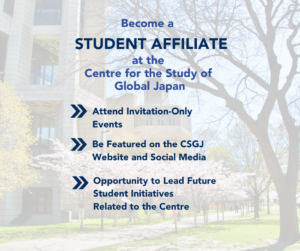On January 27th, a distinguished panel of U.S.-Japan relations experts assembled to discuss “China’s Growing Power and A New Era for the US-Japan Alliance.” Panelists reflected on both intensifying cooperation between the US and Japan as well as emerging challenges posed by the rise of China. The event was co-sponsored by Centre for the Study of Global Japan at the University of Toronto and the Initiative for Global Security at the John Sloan Dickey Center for International Understanding at Dartmouth College. Professor Phillip Lipscy, Director for the Centre for the Study of Global Japan, moderated the event.
Lipscy opened the panel by introducing several core themes and questions, including, “What are the security challenges the U.S. and Japan face in the Asia-Pacific region today and into the future?” “What policy instruments, whether they be military, technological, economic, or political, do the allies need to prioritize in order to address these challenges?” and “What are the areas of strengths in the U.S-Japan alliance and what areas need further attention?”
The first panelist was Professor Mori Satoru from the Faculty of Law and Department of Global Politics at Hosei University. Mori began the discussion by outlining three major challenges the U.S-Japan alliance faces, including deterring China from overturning the geopolitical status quo by means of force, promoting a free and open economical order in the Indo-Pacific region, and managing crises and stabilizing relations with China. Mori emphasized the strengths of the U.S.-Japan alliance by explaining how bilateral cooperation between the U.S. and Japan has become closer and more robust in recent years, detailing a combined operational plan to manage a Taiwan contingency as evidence of this shift. He also pointed to defense technology as an area of further collaboration, citing a recent statement made by the U.S.-Japan Security Consultative Committee, in which both nations pledged bilateral investment into machine learning, artificial intelligence, and quantum computing in order to maintain a technological edge over potential adversaries. Mori noted that the Consultative Committee improves predictability compared to unilateral national responses. He pointed to these developments as indicative of a U.S.-Japan alliance that is able to strategically adapt when faced with multifaceted challenges posed by a growing China.
The second panelist was Professor Andrew Oros from the Department of Political Science and International Studies at Washington College. Oros started his remarks by discussing looming “gray zone threats” that the U.S.-Japan alliance faces, such as Chinese military incursions in the waters surrounding disputed islands in the East China Sea. A second gray zone threat is the increased escalation of cyber-attacks, which have compromised both military and civilian targets. Oros pointed to these developments as evidence of a new era for the U.S.-Japan alliance. He also described his own research detailing how population affects great power competition. Oros noted that Asia is at the forefront of a demographic transformation and may provide key insights into how such shifts affect political and foreign policy decision making.
The third panelist was Professor Hikotani Takako from the International Centre of Gakushuin University. Hikotani situated her discussion of the U.S.-Japan alliance in the broader context of U.S. foreign policy and domestic Japanese politics. Hikotani described Japan as a cornerstone for U.S. policy in the Indo-Pacific region. She noted that U.S. Ambassador to Japan, Rahm Emanuel, stated that what the U.S. and Japan do together in partnership over the next three years will decide the posture of the two nations for the next thirty years. Hikotani described how the Japanese public views the rise of China through the prism of how strong the U.S.-Japan alliance remains. She explained how recent American military actions, like the nation’s departure from Afghanistan, raised questions about U.S. commitments in some corners, but belief in the credibility of the U.S-Japan alliance remains generally strong. Hikotani closed by noting that the next year is an important one in regards to the upcoming Quad Summit in Tokyo in the spring of 2022, the Japanese Upper House elections in July 2022, and Japan hosting the G7 summit in 2023- all events that will further test the strength and resilience of the U.S.-Japan alliance moving forward.
Professor Jennifer Lind of the Government Department at Dartmouth College delivered closing remarks before kicking off the Q&A session. Lind noted the importance of a sustained approach to China’s rising power in order to ensure key security goals remain intact for the alliance. In light of Chinese efforts to pursue regional dominance through military and economic means, Lind closed by noting that flexibility and adaptability will be key to keeping the alliance strong.
Following the panel discussion, there was a lively question and answer session with over 200 audience members from around the globe. The panelists answered questions on topics such as a contingency over Taiwan, how the COVID-19 pandemic altered foreign relations in the region, and how cooperation between the U.S. and Japan could facilitate the development of defense technologies and capabilities.
We would like to thank the panel for their timely insights and audience members for an engaged Q&A session.

